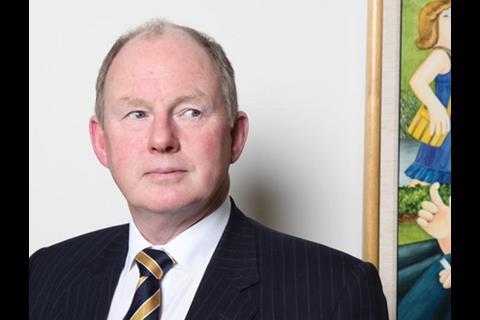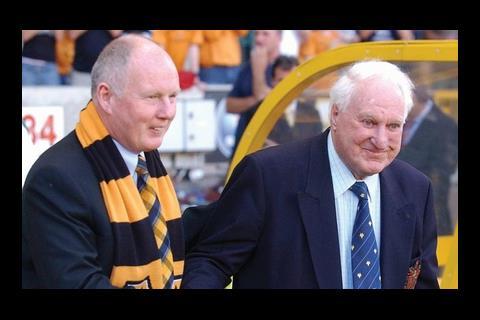You can’t imagine much intimidates Steve Morgan. In his time, the 57-year-old former site engineer has battled the prime minister of Thailand for control of Liverpool football club, founded Redrow at the age of 21 with a £5,000 loan from his father and was on the wrong end of a reported £100m divorce payout
But he admits that walking back into Redrow’s Flintshire head office for the first time in eight years, after he returned via a boardroom coup last March, gave him a “back-to-school feeling”.
It can’t have helped that certain changes had been made in his absence. “I was laughed at by a colleague when I said I was going to the canteen for lunch,” he says in his measured Scouse tone. “He said it had closed three years ago to save money – it was just done to save thruppence ha’penny. There is nowhere for miles to buy a bloody sandwich and people were getting in their cars and going out, which is bad for morale. The first order I gave was to clean the fucking canteen up – it had been collecting cobwebs.”
As Morgan breaks his silence about his first year back in charge of the £300m-turnover firm he calls “my baby”, it is clear that the order was the first of many.
The venue is Bonhams auctioneer on London’s Bond Street. Looking at Redrow’s freshly launched New Heritage range of 34 houses, you could be forgiven for thinking the credit crunch never happened. The design is inspired by the late 19th-century arts and crafts movement (“traditional homes built the way you remember”) and it’s a far cry from the Debut range of compact living promoted by the management team he supplanted.
But he didn’t splurge more than £50m of his estimated £350m fortune to seize back control of Redrow on architectural grounds. So is the launch simply Morgan returning to what he knows best or a credible blueprint for success in post credit-crunch England? He says he hopes it is a perfectly timed combination of both.
The news that the man placed 146th on the Sunday Times Rich List was returning to Redrow sent a wave of excitement through an industry ground down by debt-for-equity swaps and breached covenants.
And he was quick to remind people of his populist touch. At his comeback performance to the City in July, many found Morgan’s bluntness a refreshing contrast to the polished, if unforthcoming, tones of some of his peers. “It was great,” says one analyst, “every other word was a swear word.”
He had an even better reception at Redrow’s HQ. “The two receptionists, Alison and Margaret, jumped up and gave me hugs and kisses and there were tears. They probably wouldn’t know it, but it meant a lot to me,” he says, as his eyes well up and soften his normally beady grey-blue gaze.
The wanderer returns
During his absence Morgan had kept busy, pursuing other property ventures and buying Wolverhampton Wanderers football club in 2007 – the outgoing owner said Morgan had had “a heart transplant from Liverpool to Wolves”. And then there was that £100m divorce in 2000, which propelled his ex-wife Pamela onto the Rich List and ranks among the UK’s highest ever payouts. It came out of the £240m he made when he cashed in his Redrow shares in 2000, six years after he had floated the company.
But after an initial feeling of relief at walking away from an industry tied up in red tape, Morgan says he grew “increasingly frustrated” watching from the sidelines. It was over a casual chat at a drinks party during the 2008 Christmas period that he decided to act. “I was with a pal who owns a chain of estate agents and I asked how it was going,” he recalls. “He said unbelievably all their offices over Christmas were the busiest they’d been in four years. My ears pricked up and I started watching the market intently.”
By March 2009 he’d built up a 23.5% stake in Redrow. He says the firm’s management didn’t realise how large it was because of the hidden financial vehicles he used.
Meanwhile, hedge fund Toscafund had amassed a 25% stake of its own. Morgan says the two began talks in February, when he bought a 15% stake from the fund. But it was their combined might that enabled the boardroom coup, ousting Neil Fitzsimmons, the chief executive, and eventually David Arnold, the finance director in the process.
He won’t name names but is scathing in his assessment of what had gone wrong. “He was furious,” says a source close to the situation, suggesting he was upset that “a bunch of accountants had been running his company”. It is reportedly the reign of Paul Pedley, Fitzsimmons’ predecessor, that Morgan reserves particular ire for, blaming him for the company’s move away from traditional housing and becoming what one analyst last week called “a laggard” of the industry.
The first victim was red tape and he quickly set about remodelling the company in his own image. He says: “You couldn’t fart without filling in a form. The staff appraisal form was 40-something pages. I’ve instructed them to get it down to four – it was like a sodding phone book and tied people up. No wonder appraisals were unpopular.”
He was also reportedly horrified when he saw the accounts, although diplomacy will only allow him to say: “I thought the writedowns [£259m in September 2008] had put the business into a better shape, so it was disappointing we had to announce more last summer [£319m].” You sense more profanity is on the tip of his tongue, though.
Other changes included streamlining the land buying process and halving the number of board meetings to every other month. He says managers’ weekly reports are no longer like “a bloody London telephone directory”.
Morgan is also dismissive about how the wider industry had changed, likening much of its output to a ‚ÄúStalinist‚Äù housing estate. He adds: ‚ÄúPlanning, health and safety, ∫√…´œ»…˙TV Regs ‚Ķ it never stops changing. There is always someone who wants to fiddle with things. There‚Äôs so much red tape today and what‚Äôs frightening is that the tide is still going in that direction.‚Äù
The Tories don’t escape his wrath either. At the press conference to launch the new range he likened the party’s plan to scrap regional planning targets to “putting mice in charge of the cheese cupboard”. He said: “I know they say they want to put incentives in place, and that will work in some areas. But it will not work in the leafy suburbs, predominantly in the South-east, where there is the most demand. I fear that in whole swaths of the country’s development will grind to a halt.”
He also took a swipe at planners for not wanting to approve homes of a more traditional style. “If we had the land we could build 5,000 home this year. We’re still working at 50% capacity. The reason for the housing shortage is the planning system. Lots of councils are clinging on to PPG3.”
The path ahead
So, rant over; what exactly is he bringing to the table? He takes us back to January 1993 and the launch of the original Heritage range. “It included things that changed the industry. Up until then, people had avocado bathrooms and horrible flowered tiles and we brought in white bathroom suites.”
And New Heritage? “What you’ll see now is the bland PPG3-style housing disappear. You will see more family housing – people will copy us – it will be more architectural and the industry will up its game on spec.” The success will only be measurable by sales in two to three years’ time (the range will account for just 2% of its output in the year to 30 June) but, given his force of personality and track record, most are banking on him.
The City supports the move. Tony Williams, an analyst at ∫√…´œ»…˙TV Value, says: ‚ÄúWhat Steve lacks in modernity, he makes up for with commercial nous; and he will be a force to be reckoned with. He will turn Redrow around and his timing is good.‚Äù
Kevin Cammack, an analyst at Cenkos Securities, says: “In markets where things are going up or down at speed, the difference is people like him. I’d put him in the same class as Tony Pidgley, and his understanding of housebuilding and land buying will show through when the market stabilises.”
And his move into traditional family housing? Cammack says: “If he only gets a price premium of between 0% and 5%, you could argue it hasn’t succeeded. Anything between 7% and 10% will be a success.”
Alastair Stewart, analyst at Investec Securities, believes Morgan is right to move away from “ghastly generic boxes”. He says: “The one product overwhelmingly in demand is family housing. It has been a complete falsehood that we can address housing needs by cramming people into substandard flats.” Another advantage, he adds, is that buyers of three or four-bedroom family houses generally have the financial means to move.
Morgan himself doesn’t go into great detail about how he will measure success beyond stating that Redrow needs to “be seen as a class act again”. He says: “There is no exit plan. The priority is to get Redrow at the top of the tree – what we were always considered to be when we used to win housebuilder of the year competitions. I wouldn’t even enter the competition at the moment.”
Last week’s half-year results were a good start. With units sales of 1,266 (+21%), turnover of £187.2m (+25%) and net debt down from £269.1m to £49.3m, most in the City agree the Redrow recovery has begun.
Denying that he plans to take the company private any time soon, Morgan says delivering a profit is one of his top priorities, having crossed the two first hurdles of a rights issue (£150m in September) and the New Heritage launch.
So would he have come back if he thought Redrow had not needed his help? “I’m not sure of the answer to that,” he begins, falteringly. “If the company had been doing a great job and the firm was making a good profit, there wouldn’t have been the draw.” And then the proud father in him interjects and you wonder if he really meant it. “ I’m very parental about this business. I gave birth to this business. It’s my baby.”
Original print headline - me and my baby





























No comments yet